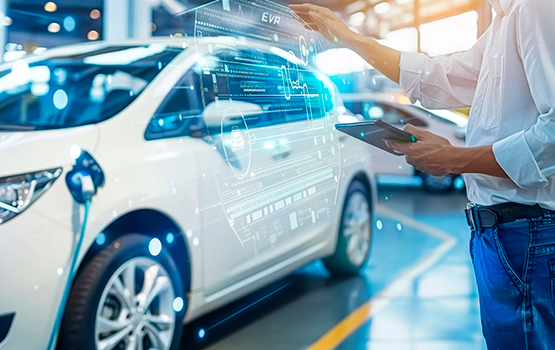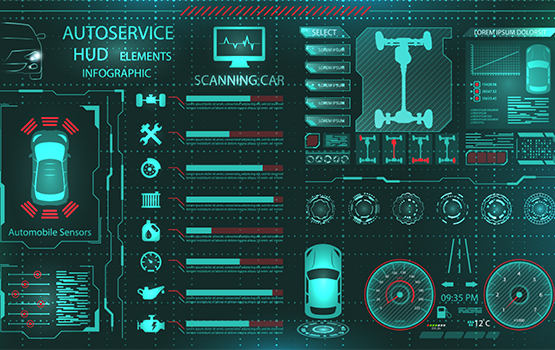Veljko Vucinic, M.Sc.
- Group: Prof. Sax
- Room: 116
CS 30.10 - veljko vucinic ∂does-not-exist.kit edu
Engesserstr. 5
76131 Karlsruhe
Curriculum vitae
- Research associate at ITIV since November 2022
- Software engineer at RA Consulting since October 2022
- Master in control engineering at Faculty of Mechanical Engineering in Belgrade, Serbia
- Finished in Jun 2022
- Title of the thesis: „Intelligent control of the trailers braking system“
- Bachelor in mechanical engineering at Faculty of Mechanical Engineering in Belgrade, Serbia
- Finished in August 2020
- Title of the thesis: „Preliminary design of the electromechanical actuator system“

Diagnostics in Electric Autonomous Vehicle System Development Lifecycle
Electric autonomous vehicles (EAVs) have emerged as a promising alternative to traditional transport with a goal of increasing mobility and sustainability. However, ensuring their reliable performance and road durability poses new challenges, compared to the traditional solutions. This is a consequence of the incomplete revolution of diagnostics for EAVs propulsion-related systems, such as electromotor drivetrain, battery, battery management system, power electronics, etc. The diagnostic system plays a crucial role in accumulating knowledge, which can accelerate development of EAVs and enhance their reliability.

Electric vehicles diagnostic AI applications
To ensure the reliability, proper functioning, and maintenance of Electric Vehicles (EVs), a robust and efficient diagnostic system is essential. AI-based techniques in diagnostics offer a promising solution for fulfilling the needs of EVs. Applications of machine learning (ML) dealing with data-based models, fuzzy logic incorporating the expert knowledge, and their combinations can revolutionize the field with predictive diagnostics, maintenance, and monitoring. By predicting potential future system faults, misbehaviour or need for maintenance, this approach can make electric mobility more accessible and sustainable.

Development of remote monitoring vehicle systems
During the operation of the autonomous vehicles, the absence of human driver raised critical future issues. For example, the driver can react to unknown in vehicle vibrations, sound, smell, dynamics etc. Together with that, problems with propulsion-related systems cannot simply be displayed with the check engine light. With one of the main monitoring systems out of the loop (human driver), the need for the safe and reliable remote monitoring and diagnostic system is raised. Coupling these systems with V2X represents great challenges.
Supervised student works
-
MA: „Development and comparison of synthetic data generation models for On-Board Diagnostic data“
-
MA: „Short-Term Predictive Diagnostics of Thermal and Electrical Faults in Electric Vehicle Battery Systems“
-
MA: „Enhancing the reliability of Battery Electric Vehicles with automated deep data analysis“
Publikationen
Vučinić, V.; Seidel, L.; Lukežić, N.; Hantschel, F.; Kotschenreuther, T.; Aleksendrić, D.; Sax, E.
2026. IEEE Access, 1. doi:10.1109/ACCESS.2026.3664118
Vučinić, V.; Aleksendrić, D.
2025. Soft Computing, 29 (17-18), 5449–5464. doi:10.1007/s00500-025-10889-1
Vučinić, V.; Hantschel, F.; Kotschenreuther, T.
2025. SAE Technical Paper Series, Art.-Nr.: 01–5010. doi:10.4271/2025-01-5010
Kraus, D.; Baumann, D.; Vučinić, V.; Sax, E.
2025. World Electric Vehicle Journal, 16 (2), Article no: 111. doi:10.3390/wevj16020111
Kraus, D.; Fuchs, S.; Vucinic, V.; Kiebler, J.; Wagner, A.; Sax, E.
2024. EVS37 Symposium : COEX, Seoul, Korea, April 23-26, 2024
Stang, M.; Seidel, L.; Vučinić, V.; Sax, E.
2024. Human Interaction and Emerging Technologies (IHIET 2024). Ed.: T. Ahram, 195–206, AHFE International. doi:10.54941/ahfe1004569
Vučinić, V.; Seidel, L.; Stang, M.; Sax, E.
2024. Human Interaction and Emerging Technologies (IHIET-AI 2024): Artificial Intelligence and Future Applications, 142–152, AHFE International. doi:10.54941/ahfe1004564

